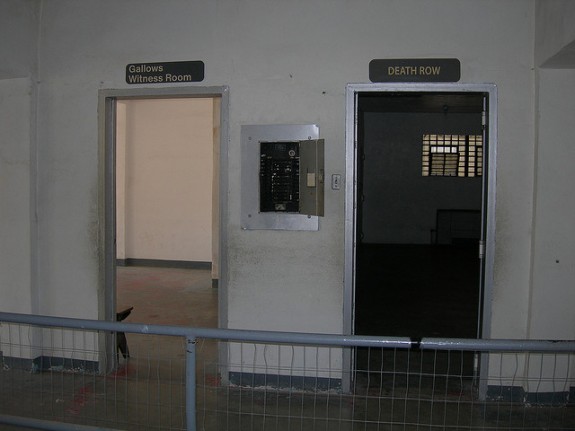By Ashley Lopez
Florida Center for Investigative Reporting
On Thursday, the Florida Supreme ruled that a 2013 law aimed at speeding up death penalties in the state was constitutional.
State legislators passed the law in an effort to speed up the appeals process for people on death row, which proponents of the “Timely Justice Act” argued was taking too long. Opponents of the law said it made it harder for innocent people on death row to submit late evidence.
However, according to the News Service of Florida, the state Supreme Court did not agree with opponents.
Justices, in a unanimous decision, rejected arguments that the “Timely Justice Act” would be an unconstitutional infringement on the court system’s authority and separation of powers and violate due-process and equal-protection rights.
In a concurring opinion, Justice Barbara Pariente emphasized that the law would not affect the Supreme Court’s “solemn responsibility” to block executions if needed to ensure that defendants’ rights have been protected.
“(This) court is still constitutionally entrusted with the duty to issue a stay of execution if there is a meritorious post-conviction claim pending or, if at the time the warrant is signed, the defendant brings a successive post-conviction challenge that casts doubt on his or her guilt, the integrity of the judicial process, or the validity of the death sentence imposed. … In my view, that remains the essential fail-safe mechanism this court may utilize when necessary to ensure that the ultimate punishment of the death penalty is inflicted in a manner that fully comports with the constitution,” wrote Pariente, who was joined in the concurring opinion by Justices Jorge Labarga and James E.C. Perry.
The “Timely Justice Act” was introduced in the Florida Legislature by House Criminal Justice Chairman Matt Gaetz, R-Fort Walton Beach. Gaetz argued that it was unacceptable that some inmates spent decades on death row. He said it was wrong for taxpayers to pay the bill for inmates languishing in prison cells for so many years. When Gov. Rick Scott signed the bill almost exactly a year ago, Gaetz tweeted, “Several on death row need to start picking out their last meals.”
However, Slate reporter Emily Bazelon pointed out the situation is more complicated than Gaetz’s analysis. In fact, she writes, a lengthy appeals process has actually helped innocent people on death row prove their innocence before their sentence is carried out.
According to Bazelon:
[The Timely Justice Act] is a particularly troubling plan given the circumstances in Florida. Since the mid-1970s, the state has executed 77 people. Florida has also exonerated 24 people who’ve been sentenced to die—the most of any state. In other words, for every three inmates executed, one is set free.
What’s the problem in Florida—why do they convict and sentence to die so many innocent people? It’s the only state in the country in which a simple majority of the jury—a vote of 7 to 5—can send a man or woman to the electric chair or lethal injection. Every other state but one requires a unanimous vote. (The other exception to that rule, Alabama, requires 10 votes).
Another huge problem in Florida: the low quality of defense lawyers, especially at trial. Florida Supreme Court Justice Raoul Cantero has said that “some of the worst lawyering” he has ever seen has been in death penalty cases, where some counsel “have little or no experience.” In 2006, the American Bar Association reviewed Florida’s death penalty system, questioned its fairness and accuracy, and made 11 recommendations for reform. The Florida Supreme Court and the Florida bar have also urged a comprehensive review. None of this has happened, as Andrew Cohen points out in the Atlantic.
Upon signing the bill, Scott had already been signing death warrants at a very high rate. By February of this year, Marc Caputo with The Miami Herald did the numbers and found that “when Juan Carlos Chavez was put to death at 8:17 p.m. Wednesday, [February 12, 2014], his execution marked the 13th on Florida Gov. Rick Scott’s watch — a record among first-term Florida governors since the death penalty was reinstated in 1976.”
Since Scott became governor in 2011, he has singed 17 death warrants.
The next execution will take place in a few days. According to the Associated Press, John Henry– who is convicted of killing his estranged wife and her young son– is scheduled to be executed next week.

